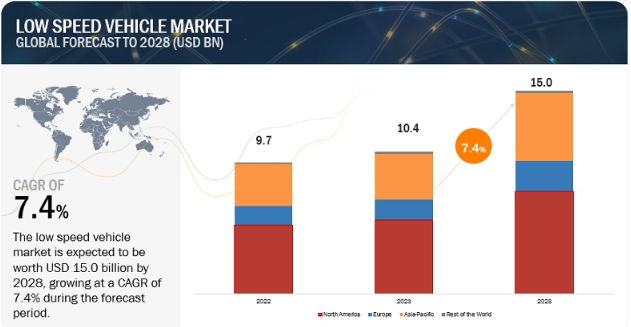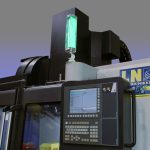Low-speed electric vehicle market to reach $8.48 billion by 2030
Low-speed electric vehicle market to reach $8.48 billion by 2030
The Low-Speed Electric Vehicle Market Forecast and Global Analysis to 2030 report found that the market is expected to grow from $5.52 billion in 2022 to $8.48 billion by 2030; and is anticipated to grow at a CAGR of 5.5% from 2022 to 2030.

According to The Insight Partners, "Low-Speed Electric Vehicle Market Forecast and Global Analysis to 2030 report, the market is expected to grow from $5.52 billion in 2022 to $8.48 billion by 2030; it is anticipated to grow at a CAGR of 5.5% from 2022 to 2030.
Lithium-ion batteries are commonly used in the production of electric vehicles. However, the rising concern about the shortage of lithium is pushing the industry towards using lithium-ion phosphate and sodium-ion batteries. Lithium-ion phosphate is gaining momentum as an essential electric vehicle battery material in the automotive industry, with a prime focus on producing affordable electric vehicles.
Global Low-Speed Electric Vehicle Market Scope:

Lithium-ion phosphate batteries are widely available in the Chinese market and are gradually gaining traction worldwide.
In 2023, Ford collaborated with CATL to set up a 35 GWh (gigawatt-hour) lithium-ion phosphate cell manufacturing factory in Michigan. In addition, sodium-ion batteries are equipped with faster charging times and can register a longer lifespan than lithium-ion batteries. In addition, sodium-ion technology has been gaining popularity across the globe, with few companies working towards commercializing it for electric vehicle applications.
Thus, the advent of lithium-ion phosphate and sodium-ion batteries for electric vehicles is likely to fuel the Low-speed electric vehicle market growth during the forecast period.
The Low-Speed Electric Vehicle market share is segmented based on product and end user. Based on product, the market is bifurcated into passenger vehicles and utility vehicles. By end user, the market is segmented into golf courses, hotels and resorts, airports, residential and commercial premises, and others. Textron Inc., Yamaha Motor Co. Ltd., Club Car, The Toro Co., Renault SA, Star EV, Waev Inc., Bradshaw Electric Vehicles, Clean Motion AB, and Navya SA Companies in the Low-speed electric vehicle market are highly focused on manufacturing cost-effective and energy-efficient vehicles that can support long-haul journeys without frequent recharging. The application of new battery materials that are more power efficient than conventional lithium-ion batteries is a major focus area of the companies operating in the Low-speed electric vehicle market.
Key developments
Textron Inc., Yamaha Motor Co. Ltd., Club Car, The Toro Co, Renault SA, Star EV, Waev Inc., Bradshaw Electric Vehicles, Clean Motion AB, and Navya SA are among the key Low-speed electric vehicle market players profiled during this study. In addition, several other important Low-speed electric vehicle market players have been studied and analyzed during the study to get a holistic view of the Low-speed electric vehicle market and its ecosystem.
In 2023, My Electric Vehicle Ltd launched MEV CITY 3.0. The car is specifically designed for the needs of young drivers. The MEV City 3.0 allows teenagers aged 15–17 to drive it under a compulsory basic training license
In 2021, The company launched a three-wheeled, electrically powered vehicle that can travel up to 300 km on a single charge.
End-user overview
Based on end-user reports, the low-speed electric vehicle market share is segmented into golf courses, hotels & resorts, airports, residential & commercial premises, and others. LSEVs have multiple applications in hotels and resorts, which help enhance guest experiences, improve operational efficiency, and promote sustainability. The vehicle's flexibility and suitability for navigating within the property grounds make it a valuable asset in the hospitality industry and is driving the Low-speed electric vehicle market growth.
Low-speed electric vehicles (LSEVs) are commonly used in golf courses for a variety of purposes due to their efficiency, environmental friendliness, and suitability for the unique needs of golf course operations.
In golf courses, LSEVs are widely used as golf carts. They transport golfers and their equipment across the course, allowing for a more enjoyable and efficient golfing experience. LSEV golf carts are quiet, produce zero emissions, and are designed to navigate the fairways and rough terrain of a golf course. LSEVs are used by golf course maintenance crews to perform various tasks such as mowing greens, fairways, and rough areas.
The vehicle's low-speed capabilities make it ideal for precision work, and it can be equipped with specialized attachments for different maintenance tasks. LSEVs have become indispensable in the golf course industry, offering a range of applications that enhance the golfing experience, improve maintenance efficiency, and promote sustainability. The vehicle's ability to operate quietly, produce zero emissions, and navigate the specific terrain of golf courses makes it well-suited for these purposes.
To order a copy of the report, click here.





